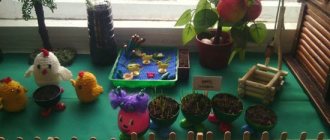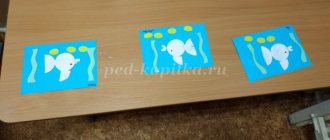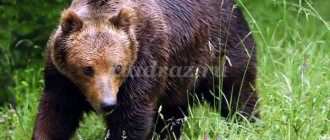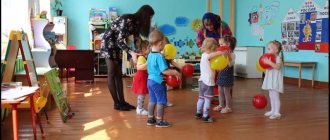Patriotic education project “My Small Motherland”
Project “My Small Motherland”
Project passport .
Relevance of the project
: Love for loved ones, for kindergarten, for one’s hometown and home country play a huge role in the development of a child’s personality.
In recent years, there has been a rethinking of the essence of patriotic education, the idea of \u200b\u200beducation of patriotism and citizenship, acquiring increasing social significance, is becoming a task of national importance.
Objective of the project
: Education of a humane, spiritual and moral personality, worthy future citizens of Russia, patriots of their fatherland.
Project objectives
:
— Instilling in children a sense of love for their native land, their small Motherland, based on familiarization with their native nature, culture and traditions.
— Formation of feelings of attachment to your home, kindergarten, and your loved ones.
— Expanding ideas about your hometown.
— Fostering patriotism, respect for the cultural past of Russia, means of aesthetic education.
Project
participants : children of the younger group, teachers, parents.
Project type
: short-term, educational, group, creative, informational.
Project
duration : 2 weeks.
Expected results
:
— Formation of feelings of pride in one’s native land, awareness of oneself as part of the surrounding world.
— Expanding children’s horizons through viewing paintings, illustrations, photographs, through communication and play activities.
— Joint work of teachers and parents in organizing work with the values of our culture, attractions, and events.
Providing project activities:
— Selection of visual and didactic material.
— Selection of works of Russian folk art.
— A selection of visual material for productive activities.
— Exhibition of drawings, crafts, books, photographs.
Stages of
the project
:
1. Preparatory:
— Theoretical preparation of the teacher for the implementation of the project.
— Creation of a subject-development environment, preparation of visual and didactic material.
— Development of a long-term plan.
— Working with parents.
2. Organizational and practical:
— Conducting a series of educational educational activities on the topic: “Mom, Dad and I are a family”
,
“My beloved mother”
,
“The house where I live”
,
“Nature of our region”
,
“Seasons”
,
“Pets”
- Review of the photo album “My Family”
,
“Nature of our region”
,
“Sights of our city”
.
— Reading fiction and educational literature, nursery rhymes, chants, riddles, jokes about plants, animals, insects: nursery rhymes “Our ducks in the morning”
,
“Like our cat”
,
“White-sided Magpie”
;
R. n. fairy tales "The Ryaba Hen", "Turnip"
,
"Teremok"
,
"Kolobok"
,
"Masha and the Bear"
,
"Zayushkina's Hut"
, fairy tales and stories by modern authors:
"Toys"
- A. Borto,
"Duck"
E. Charushin, V. Suteev
“Who said Meow”
, S.
Marshak “The Tale of a Stupid Mouse”
and others.
-Creative activity: drawing “Falling Leaves”, “Lights lit up in the houses”.
Modeling: “Kolobok is rolling along the path”
,
“Bowls for Three Bears”
,
“Berry for Birds”
.- Learning and listening to folk songs, learning songs about animals, seasons, musical and rhythmic games and dances.
— Didactic games: “Find the cub ”
,
“Who lives where”
,
“Find out the animal”
,
“Collect a nesting doll”
,
“Name the fruits and vegetables”
,
“Who is wearing what”
,
“Who eats what”
, “Wonderful bag” ,
“Let’s help the doll get dressed”
,
“ Birds"
,
"Morning, Day, Night"
.
- Dramatization games: “Kolobok”,
“Turnip”
,
“Teremok”
3. Final stage:
— identifying the knowledge and skills of children acquired during the project.
Long-term planning for patriotic education in the 1st junior group .
First week
:
— Conversation “Mom is the most beautiful word on earth”
.
— Drawing “Color a handkerchief for mommy”
.
— Theatrical performance of the Russian folk tale “Turnip”
.
— Examination of illustrations “All kinds of mothers are needed, all kinds of mothers are important”
.
— Reading fiction “Teremok”
.
— Role-playing game “Hospital”
.
— Didactic game “Seasons”
.
— Environmental campaign “Let’s feed the birds in winter”
.
- Carrying out finger games.
Second week
:
— Conversation “My Family”
.
— Role-playing game “Family”
— Conversation about the house where children live and construction on the topic “We will build a new house”
.
— Introduction to the profession of a salesperson and role-playing game “Shop”
.
— Observation on a walk: the plants of the site, the nature of the native land.
— Didactic game “Wild and Domestic Animals”
.
— Modeling “We invite the bullfinches to eat the rowan quickly”
. observing the work of a janitor while walking. Joint activities to clear leaves from the area.
— Examination of the photo album “Our Beloved City”
.
Working with parents
.
— Promotion for parents: “Let’s feed the birds”
.
— Consultations for parents “Moral and patriotic education of children of the younger group”
— Design of the folder – movement “ Raising a child in the family ”
— Individual conversations with parents about how to teach children to love and protect nature, and about how to introduce children to their hometown.
I offer parents joint trips with their children, during which the kids get to know the area, admiring the most beautiful places in their small homeland.
Project summary :
1. Children talk with love about their family, about the house in which they live. 2. With the help of didactic games, they name wild and domestic animals, some birds, vegetables and fruits, distinguish between morning, day, evening, night. 3. They know and follow the rules of the folk games “Zainka”
,
“Shaggy Dog”
,
“By the Bear in the Forest”
,
“Hen and Chicks”
and others. 4. They know nursery rhymes, poems by A. Barto, fairy tales, and try to dramatize them. 5. They love to watch while walking and talk about what they saw there. 6. Name their city and look at the photographs.
Bibliography.
1. Bondarenko T. M. “Comprehensive classes in the 1st junior group ”
.
2. Aleshina N.V. “Patriotic education of children ”
.
3. Internet resources:
— “the role of the family in shaping the child’s personality”
.
— “Patriotic education of young children ”
— “Moral and patriotic education of preschool children, as one of the directions in working with parents.”
MDOU "Kindergarten No. 83 combined type"
Project activities
on the topic of:
“Moral and patriotic education of children in the first junior group “My Small Motherland”
Prepared by:
Kovyreva N.N.
teacher
Ladoshkina T.V.
Educator
Saransk 2017
Short-term project in the 2nd junior group Topic: “Forever beloved native land...”
I learned that I have a huge family: And the path, and the forest In the field - every spikelet, The river, the blue sky - This is all mine, dear! This is my homeland! I love everyone in the world!
V. Orlov.
Explanatory note
Type of project: artistic - aesthetic, educational, group.
Duration: 2 weeks.
Participants: children, teachers, parents.
Relevance:
It is necessary to cultivate patriotism from early childhood. One of the leading factors in the formation of the patriotic consciousness of children is the cultivation of love for the child’s closest environment - family, home, kindergarten and his city, his homeland. Involving children in artistic activities and creativity stimulates the aesthetic education and development of children of primary preschool age.
Target:
To give initial knowledge about our country, to acquaint the state with symbols, to cultivate love for our hometown, for our country. To develop visual-figurative thinking, cognitive activity, fine motor skills, creativity, play activity, visual-effective thinking, perception, sensorimotor coordination.
Tasks:
To evoke in children a feeling of admiration and delight at the beauty of their homeland.
Develop a caring attitude towards nature and all living things.
Introduce children to the symbols of the state (coat of arms, flag, anthem).
To educate children's aesthetic perception.
Introduce you to the world of art.
Develop the ability to master and transform the surrounding cultural space.
Develop children's creativity in visual arts.
To form bright positive emotions in children in the process of their creative interaction and artistic and active communication with adults.
Develop imagination, independence, perseverance, the ability to complete work, accuracy and hard work.
Help children master the techniques and techniques of artistic creativity.
Expected Results:
Fostering a sense of pride for your family, for your homeland.
Development of curiosity, creativity, cognitive activity, and communication skills in children. Children will learn to create images of objects from ready-made figures, select colors that match the objects depicted, use cutting, twisting, quilling, and modeling from strips of paper in their work.
Materials.
Tinted lit A4, strips of colored paper, colored cardboard, crepe paper, cotton wool, PVA glue, glue stick. pencils for cutting.
The project includes three main stages:
1st – preparatory
2nd - project implementation
3rd - final
Collaboration with family:
Enriching parental experience in developing children's creative abilities.
Consultations “Patriotic education of younger preschoolers.”
“Quilling. New ideas for creativity."
The first stage is preparatory
- Select children's literature on the subject of the project.
- Prepare material for visual activities, conversation “We live in Russia.”
- Look at illustrations on the symbols of Russia, read poetry, listen to audio recordings on the topic, look at the illustrations in the “My Moscow” folder.
The second stage is the main one
Joint work with children on the topic: “Native Land” (application).
The work was carried out in the afternoon, lasting 30 minutes with one break for physical education. During the implementation of this project, to continue the development of artistic and creative abilities and fine motor skills, techniques such as twisting (birch tree trunks), trimming (tree crowns), quilling (sun, daisies) were used. More complex elements (spikelets, cornflowers) were made by the teacher.
Sequence of work:
- Preparation of individual elements: flag - gluing strips of paper in the shape of a loop of red, blue and white; silhouettes of birch trees - twisting trunks, making crowns by trimming; sun and flowers - quilling method.
- Arrangement of blanks on A4 sheet.
- Step by step gluing.
- Reviewing the finished work and discussing it.
The third stage is the final one
Joint work with children on the topic “Native Land...”
Presentation at the festival of creative abilities “Step to Success - 2018”
Result: Certificate 3rd place in the “Magic Moment” category at the festival of creative abilities “Step to Success - 2018”
Used Books:
- Vinogradova N.F., Sokolova L.A. "My country is Russia".
- E. Rumyantseva. "Applique: simple crafts."
- L.P. Savina. "Finger gymnastics."
- E.G. Lebedeva. "Simple crafts made from paper and plasticine."
- A.A. Zaitseva. Quilling. New ideas for creativity."
- Jane Jenkins "Crafts and souvenirs from paper ribbons."
- Song by D. Kabalevsky, A. Alien “Native Land...”.
- Poems: Platon Voronko “There is no better native land. S. Mikhalkov “Kremlin Stars”.



